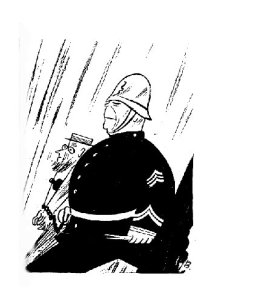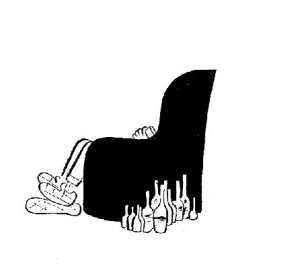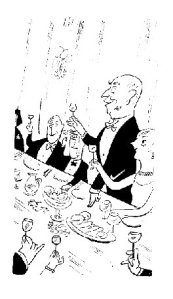The last slice was supposed to cut the happily wagging tail completely off of me and everyone else in the country!
Peace had broken out and they had to graciously let me out of the compound. Only, they would not even consider giving me permission to go home. The hysterical fear of the terrible German spy was still much too great. It has always been a puzzle to me what the authorities thought that I would be able to do—and presumably a puzzle to them as well. But that didn’t prevent them from requiring me to report to the police every three days, from always keeping a couple of detectives lounging around my hotel and following me like hounds whenever I went out. Doing house searches was always the order of the day.
During this time a general prohibition was introduced into the United States. Since Lot’s time the world has never seen so many drunken men and women as in the last week before its introduction, especially in the last night. The entire giant city of New York appeared to be intoxicated. But then they believed that it was over. All the breweries were closed, everywhere in the land. The whiskey distilleries were destroyed and California’s vineyards remained fallow. An entire population of over a hundred million people was dry—and me as well, as long as I was in that land.
Well—it turned out a little differently. First, many of the rich houses still had wine in their cellars—the law allowed them to quietly drink it. But then a remarkable eagerness set in—everyone tried to obtain drink, which could no longer be legally obtained, in other ways.
The war was over; the artificial, overblown mania against everything German began to disappear. But the people were accustomed to such wild excitement that something had to take the place of the persecuted Germans. That became a just as wild a passion against anything that was red—anything that was contaminated with Bolshevism. And the average American considered the most moderate liberal an ultra-radical.
This crusade once more populated the jails and prisons—the cells that had formerly housed “German spies” now housed so called Bolsheviks. But even that grew stale and they turned to a new sport—the battle against prohibition.
The government appointed many thousands of authorities to enforce their law. Millions that were against alcohol advertised their organizations in the classified ads and offered to help the authorities. But no matter how sharply those elements sought to enforce the law the facts showed otherwise. In the state of Philadelphia alone, no less than 20,207 people were jailed within two years for violation. (New Republic, 20 January 1926)
When you consider that not everyone who took a drink was immediately caught you can get an idea of what percentage of the occupants of that city were for alcohol and what percentage were against. Week after week and day after day this battle took on grotesque forms. It is not even countable how many ways single individuals attempted to resist this monstrous destroyer of personal freedom. To do so would require a very thick volume and fill it completely.
What is astonishing is how this repression turned an entire group of people into heavy alcoholics, people that had earlier been moderate and those that came from temperate families, people that in their entire lives only brought the weakest wine or beer to their lips. For these people the old saying really became true, “Forbidden fruit tastes the best”.
I cannot really claim that for my part. At any hour of the day or night in the “dry” United States, you could get strong drink
everywhere, again and again. But the taste only appealed to me in very rare cases. The percent of alcohol had become very high—but the quality of the drink had reached a low level.
The best beer was a brew smuggled in from Canada and could not compare with the earlier American brews, much less with German beer. The home brewed beer that many tried to make themselves was almost always undrinkable. Wine of all kinds were smuggled in, often as “Holy Wine” for the alleged purpose of being used in communion—unfortunately the Holy wine was not the good wine. But both the beer and the wine were
consumed very little compared with Schnapps, more commonly called whiskey, which had become a monopoly.
I have had to drink schnapps out of all imaginable containers, out of fountain pens, automobile tires, light bulbs and telephone receivers. Anything that was somewhat hollow appeared acceptable to conceal schnapps, and brought much joy to their fellow countrymen, especially when it was not recognized by those that had paid for it.
It became a great sport to—pull a fast one on the law at every opportunity. Frequently it was comical, yet often enough it led to very dangerous situations. I knew a judge in Missouri, who earlier scarcely drank a glass of beer. When he drank his wine—one glass every six months or so—he always mixed it with water. But with the introduction of prohibition he became a heavy boozer. Every time he became fully loaded—and that was almost every night—he would jump into his sports car and drive like a raving lunatic cross country for hours.
Firstly, he thought it was highly pleasurable, and secondly, it was an excellent way to sober up.
I had not seen him for years and didn’t know anything at all about his new passion. Otherwise I would most certainly have not accepted his invitation to a night drive. Nothing really happened—to us, but he broke his neck a half year later. After that he had uncountable accidents, by himself and with others. He completely demolished three cars, and this man was only one of very many!
There was an amusing experience that occurred to me in the Midwest. A large thriving city gave a banquette for the press after an election. I was also invited. In the reception room just before the meal rum cocktails were served—in astoundingly large glasses. Everyone smelled his or her glass and grinned in understanding. Then a tall lady with eyeglasses stood up, a member of one of the anti-alcohol, anti-Saloon societies, that the glorious prohibition had so much to thank for.
“I hope, your honor,” she said to the party giving mayor,”that this drink is not against the law.”
No expression at all showed in the city chief’s face as he fiercely answered, “I have been elected mayor of this city, in order to enforce the law.” What I dictate is the law alone and nothing else!”
With that he emptied his glass and everyone else present with him—the temperance lady as well. I must say that I have never in my life drunk a cocktail like that one—where you needed to bring the right mood along with to the banquette!




